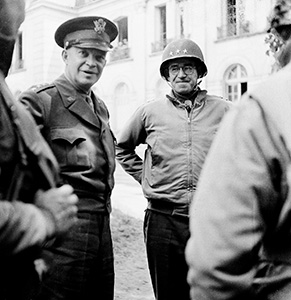
Did ‘Victory Disease’ Hurt Americans in WWII?
After reading Rick Atkinson’s “The Worst Place of Any” (Summer 2013) about the Battle of the Hürtgen Forest, I have concluded that in late 1944 many U.S. Army senior commanders were suffering from the same condition the Japanese senior commanders suffered in mid-1942: victory disease.
Like Japan’s military conquests in the Pacific and Southeast Asia in early 1942, the U.S. Army’s dash across France was relatively easy. The Germans were retreating faster than the Allies were winning. The rumor “home by Christmas 1944” spread; the Americans felt the Germans were finished and were going to fall over dead at the first sign of the Allies.
And like the Japanese High Command, which continued to believe that the American forces would be a pushover even after the Japanese suffered bloody losses and defeats in the Solomon Islands and on New Guinea, the Allied Supreme Command and U.S. Army Group Command continued to believe until the German offensive of December 1944 (Battle of the Bulge) that the German fighting units would simply melt away when attacked, just as they had in northern France.
As Atkinson points out, only a few senior commanders, such as George Patton, knew better. Both Dwight Eisenhower and Omar Bradley allowed a dysfunctional Lieutenant General Courtney Hodges, commander of the First Army, and his equally dysfunctional staff to waste the lives of American soldiers by continuing ill-conceived offense operations that were basic head-on, World War I–style attacks into the teeth of well-planned and well-defended German defensive positions.
Maj. James A. Goodwin II,
U.S. Army (Ret.)
Oak Park, Calif.
A Brooklyn Epic
What a great article about the Battle of Brooklyn (“Escape From Brooklyn,” Summer 2013). Thomas Fleming captured it perfectly!
Lt. Cmdr. Tony Piscitelli
New York Naval Militia
Keynote speaker, 234th Commemoration of the Battle of Brooklyn
First in Their Class? Says Who?
In his War List on distinguished classes of West Point (Summer 2013), Thomas Fleming states that the successes of the class of 1976 are particularly noteworthy because its graduates reinvigorated an army in disarray after Vietnam. This comment does a huge disservice to the superb flag officer leadership in the U.S. Army between 1975 and 1981. The postwar army’s recovery from its admittedly sad and mutinous state to again become a world-class fighting service took place in that period. More important, that movement was led by Chiefs of Staff Creighton Abrams and Edward “Shy” Meyer, among many other general officers of that era. They breathed life back into the principal ground fighting service of our nation, installed standards of excellence at every level, and promoted pride in service.
Without this early leadership of the army’s reformation, how could we have had the outstanding performance of U.S. Army troops in Grenada, Panama, and the First Gulf War—well before the Stanley McChrystals, David Petraeuses, and Ray Odiernos of the class of 1976 became flag officers?
In fact, it seems that the mid-1970s classes of general officers have difficulty acknowledging the real sources of their military intellectual property as it plays a role in their leadership of the army today. Those sources lie further back in history.
Col. Wayne E. Long (Ret.)
Chester, Md.
Thomas Fleming responds:
I am sorry you feel I have slighted the graduates of preceding classes in giving credit to the class of 1976 for reviving the spirit and fighting skills of the army after the ordeal of Vietnam.
Let me assure you I’m aware of the contributions of graduates such as Generals Abrams and Meyer. I wrote a history of the academy that was widely praised when it was published in 1969, and I have stayed in touch with the many friends I made in the four years I spent researching at West Point. I was also one of the principal contributors to the academy’s bicentennial history, published in 2002. The length and format of the article made it impossible to mention everyone who deserves praise for his accomplishments during and after Vietnam.
More class warfare from MHQmag.com:
I would suggest you look more carefully at the class of 1950. Many new graduates found themselves in combat in Korea instead of enjoying graduation leave. The class suffered many casualties but acquitted itself well. Uniquely, two graduates served as chiefs of staff of their respective services during the same period in the 1980s: John Wickham, U.S. Army, and Charles A. Gabriel, U.S. Air Force. This couldn’t happen again. There were also a handful of four-star generals, numerous three-star generals, and a host of others. Surely, this was an outstanding class!
Lt. James M. Thompson (Ret.)
Boise, Idaho
I am biased toward the class of 1974. In recent years, three four-star generals from the class have served as: head of the CIA (David Petraeus, after commanding forces in the Middle East); head of the NSA (Keith Alexander); and top commander in the Korean theater (Walter Sharp). Another (Martin Dempsey) is the chairman of the Joint Chiefs of Staff. They certainly were not the only leaders from the class. And don’t forget the contribution to the business world from graduates such as Kenneth Hicks (JC Penney, Footlocker) and William Albrecht (Occidental Petroleum).
Mark W. Baker
Sequim, Washington
CORRECTIONS
A caption accompanying the photo on page 77 of the Summer issue described men surveying the Union dead at Gettysburg just after the fighting. It is actually a posed photo taken long after the battle.
Our Summer review of the Ultimate Warfare television series incorrectly identified the host network as the Military History Channel. The series was produced by the Military Channel.
A caption incorrectly described an image of Alexander the Great’s siege of Tyre in 332 BC as a lithograph. It was from an illuminated manuscript.
To comment on an article, visit MHQmag.com or send an e-mail to MHQeditor@weiderhistorygroup.com. Letters are edited for length and clarity.





